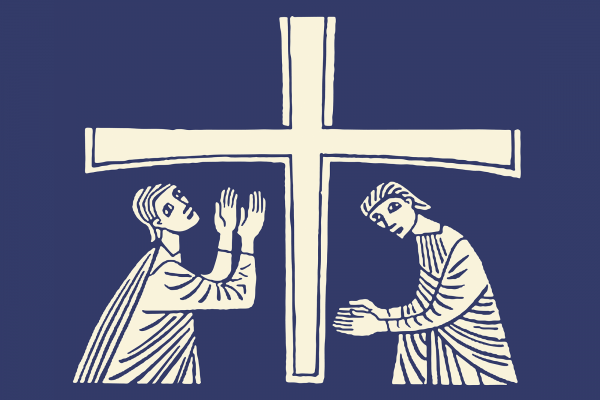AS THEY GEARED up to storm the U.S. Capitol on Jan. 6, 2021, the soon-to-be rioters carefully chose their clothes, their flags, and their symbols to convey the message they wanted to send. That message, surprisingly, had a lot to do with Jesus.
One popular flag read “Jesus 2020.” Preachers and worship leaders arrayed around the Capitol “pleaded the blood of Jesus” while their compatriots shed the blood of Capitol Police officers. Indeed, at times the Capitol riot resembled a modern-day crusade, mayhem and suffering inflicted on the innocent under the sign of the cross.
I have spent the past three years searching out the leaders and theologies that galvanized Christians to show up that day. What I’ve found are networks of hardline Christian nationalists who have cobbled together a theology of power, domination, and privileged access. I call them “Christian supremacists,” because they are making moves to restructure society to privilege and elevate Christians over everyone else.
I wish I could say that these leaders were fringy, or better yet, not really Christians, but, if anything, Christian supremacy is spreading like wildfire in the American church, especially as we careen toward another polarized election.
The early church faced a similar problem: A group of early Christians called the gnostics believed that God gave special revelation to certain individuals, the spiritual elites. The gnostics disdained the more bodily and human dimensions of the biblical Jesus in favor of an enlightened, victorious Christ.
Did you know that this was the context in which the term “Antichrist” was coined? The word occurs in the New Testament only in 1 and 2 John, short epistles written to a struggling church. A group of early gnostics had broken off to form their own sect, and those who remained were left hapless and insecure.
The author writes in chapter 2: “Children, it is the last hour! As you have heard that antichrist is coming, so now many antichrists have come. … They went out from us, but they did not belong to us; for if they had belonged to us they would have remained with us.” Here, “antichrist” is not a person but a propensity, a state of being anti-Christ. Hence, the gnostic spiritual elitists who have departed are “antichrists” (plural).
We Christians today have invested great energy imagining the Antichrist as an eschatological world-conqueror, but, in 1 John, antichrist is not a power or an identity that emerges from outside the church. Instead, antichrists originate within the church, among people who claim they are for Jesus but who undermine the very nature of Jesus. Sometimes the people who espouse the greatest love for Jesus hold him in the gravest contempt.
What the early-church gnostics and today’s Christian supremacists fail to grasp is, precisely, Jesus. Hellbent upon their own power, they cannot see that the self-emptying God did not take on flesh to form an elite clique. Jesus was not out to elevate his followers above the rest of humanity. No! Jesus, gentle and humble in heart, taught and lived service to others and self-denial.
To know that the early church was full of antichrists liberates us from the need to valorize or idealize the past. There’s no restoration of a time when Christianity was not this ungainly creature we see before us. Christianity has given the world more than its share of crusades, pogroms, inquisitions, abuses, and imperial violence. Christianity is a human tradition, full of human foibles and human tyranny, all loaded up on the whip-scarred back of a humble Jesus.
Not that I’m proposing some alternative to Christianity. A Christian I am. A Christian I remain, despite a deep acquaintance with the pain Christians have inflicted on this world. For Christianity is, like the two paradoxical natures of Jesus, full up with humanity and divinity. It’s wheat and tares, Jesus-imitators and antichrists, sublime insights and crooked institutions.
And I am still, hauntingly, inexorably, drawn to the gospel that Jesus preached and lived: The Word becoming flesh and dwelling among us. God among the God-forsaking. God bedraggled. The Self-emptying One who summons us to be self-emptying ones. The fact that haughty, proud, elitist Christianity has rarely lived “down to” Jesus’ summons simply betokens our still-in-need-of-redemption nature.
Our Christian supremacist kin — and, yes, though they are antichrists, they are still our Christian siblings — seem to be on the upswing. They appear to have the Christianity that grabs politicians’ attention. They have the snazzy, upbeat Christianity that attracts the crowds. Theirs is a muscular Christianity, worth fighting for.
And what do we have? We have the Nazarene carpenter who knows nothing of their elitism. We have the stooping God-human who knows only the sharp receiving end of their domination. Yet, somehow, Jesus absurdly, bizarrely, frustratingly also loves the antichrists, his enemies. He longs to bless and tutor them too, if only they would repent of their violent, high-and-mighty fantasies.
So, what will happen? Will the antichrists win? Will Christian supremacists remake America in their own image, endangering nonconforming Christians and non-Christians alike? We don’t know. But some of us can choose the way of Jesus. We can defy Christian supremacy and stoop to serve and defend our non-Christian friends and harassed neighbors. Christianity is always at its best when lived at the margins.

Got something to say about what you're reading? We value your feedback!






